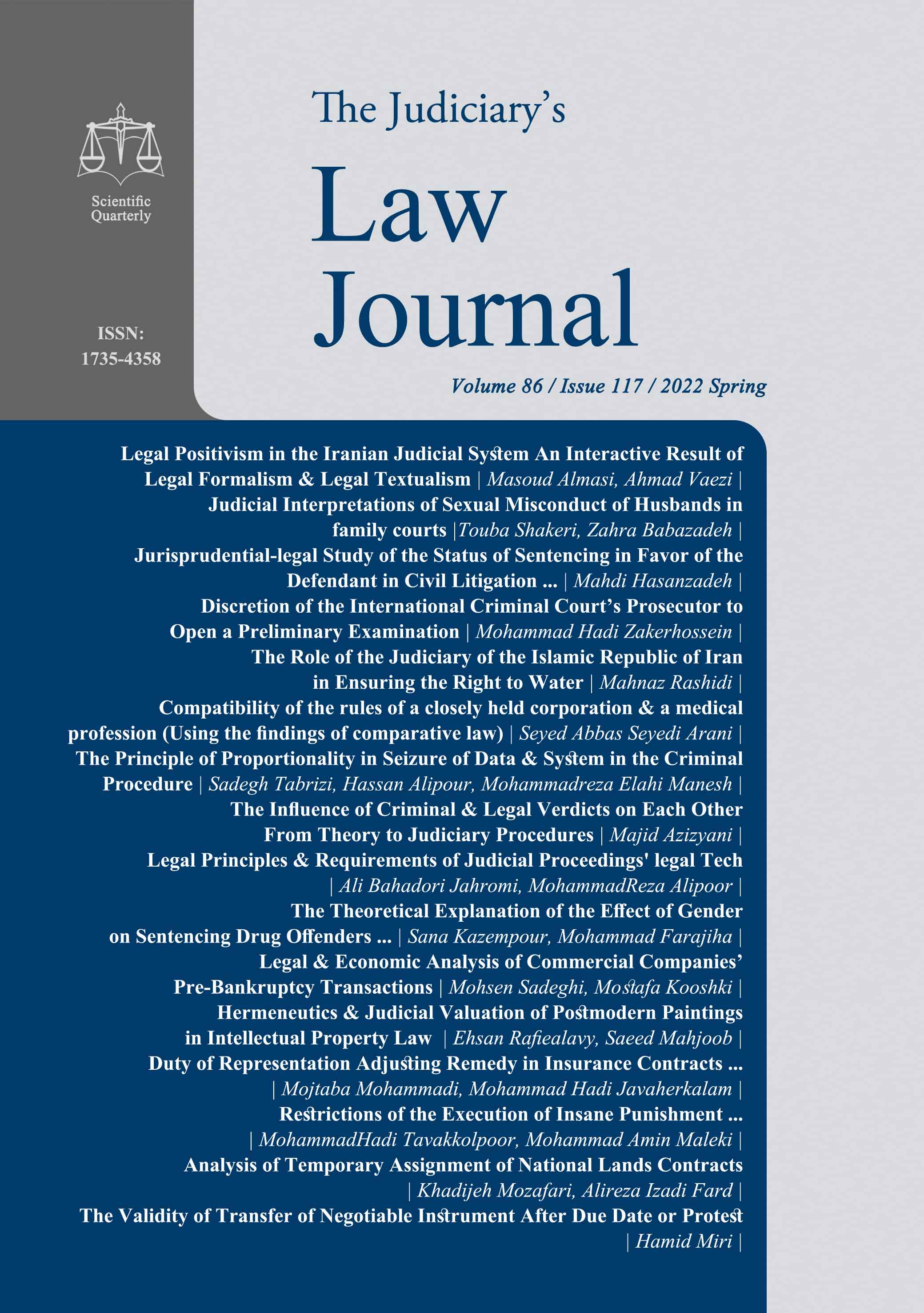Document Type : Research/Original/Regular Article
Author
Assistant Professor, Theology Department, Faculty of Humanities and Physical Education, Gonbad Kavous University, Gonbad Kavous, Iran
Abstract
Despite the widespread use of negotiable instruments in ordinary and commercial transactions, legal literature has less noted to the issue of validity and consequences of the transfer of negotiable instruments after maturity. In this paper, in addition to a comparative study of the various approaches in regulations, it also has been examined and criticized the existing legal theories in regard. These theories sometimes forbid the transfer the document after maturity whether it has been done by endorsement or delivery. It has sometimes been considered as an ordinary (noncommercial) transfer. Finally, one tries to say that this transfer just has some of the effects of the transfer of such instruments. Based on commercial customs, lack of any prohibition in regulation, existence of some indication on regulation, this essay shows that in Iranian legal system citation to the weakness and instability of the instrument and thus the holder's reliance on the transferor's credit is not compatible with ordinary willingness of parties to instrument. Apart from this reason, such deduction denies the most of the features of a protested negotiable instrument in favor of its new holder.
Keywords
Main Subjects
فارسی
- اسکینی، ربیعا (1396)، حقوق تجارت: برات، سفته، قبض انبار، اسناد در وجه حامل و چک، چاپ نوزدهام، تهران: سمت.
- بازگیر، یدالله (1386)، موازین حقوق تجارت در آراء دیوانعالیکشور، چاپ دوم، تهران: بازگیر.
- حسنی، حسن (1389)، حقوق تجارت: اسناد تجاری، جلد سوم، تهران: بنیاد حقوقی میزان.
- ستودهتهرانی، حسن (1391)، حقوق تجارت، جلد سوم، چاپ بیست و یکم، تهران: دادگستر.
- صقری، محمّد (1388)، حقوق بازرگانی: اسناد، جلد یکم، چاپ دوم، تهران، شرکت سهامی انتشار.
- عبادی، محمّدعلی (1392)، حقوق تجارت، چاپ سی و سوم، تهران: گنج دانش.
- عرفانی، محمود (1385)، حقوق تجارت، جلد سوم، چاپ دوم، تهران: میزان.
- کاتبی، حسینقلی (1387)، حقوق تجارت، چاپ دوازدهم، تهران: گنج دانش.
- کاویانی، کوروش (1383)، حقوق اسناد تجاری، چاپ نخست، تهران: نشر میزان.
- میری و حمید و حسین کاویار. (1399)، «قبولی اشخاص ثالث در اسناد تجاری»، مجلۀ تحقیقات حقوقی، شمارۀ 90.
- میری، حمید، سیروس شهریاری و مصطفی عابدینپور (1396)، «بررسی تحلیلی پیرامون برات از دریچۀ لایحۀ نوین تجارت»، مجلۀ پژوهشهای حقوقی، شمارۀ 32.
- نیکفرجام، کمال (1399)، «بررسی تمایز مهلت ظهرنویسی تجاری با مدنی اسناد تجاری در حقوق ایران و کنوانسیونهای ژنو و آنستیرال»، فصلنامۀ دیدگاههای حقوق قضایی، شمارۀ 91.
آرای قضایی
- دادنامۀ شمارۀ 9309970906100390 به تاریخ 5/7/1393 شعبۀ یکم دیوانعالیکشور.
- دادنامۀ شمارۀ 99099701329 به تاریخ 12 /11/1399 شعبۀ هشتم حقوقی دادگستری عمومی و انقلاب شهرستان گنبدکاووس.
- دادنامۀ شمارۀ 259 مورّخ 18/06/1370 شعبۀ هشتم دیوانعالیکشور.
- دادنامۀ شمارۀ 72 مورّخ 6/3/1380 هیئت عمومی دیوان عدالت اداری.
انگلیسی
- Byles, J. B. (2013). A Treatise of the Law of Bills of Exchange, Promissory Notes, Bank Notes and Checks, T. & JW Johnson.
- Bussel, J.A., Maclachlan, D. (1889) Chitty on Bills of Exchange, Promissory Notes, Cheques on Bankers, Bankers Cash Note and Bank Notes; with references to the Law of Scotland, France and Amerika, 10th ed, London.
- Bigelow, M. Madison, (2016) The Law of Bills, Notes, and Cheques, 2nd ed. Boston: Little, Brown- Leopold Classic Library.
- Herrmann, G. (1988) Background and Salient Features of the United Nations Convention on International Bills of Exchange and International Promissory Notes, University of Pennsylvania Journal of Business Law, No.10: 517-577.
- Fagan, E. T. (1956) “The Concept of Good Faith in Negotiable Instruments Law”, Indian Law Journal, No.32: 8-18.
- Jones, F. R. (1897). “Some Problems in Overdue Paper”, Harvard Law Review, Vol.11, No.1: 40-50.
- Chafee, Z. (1918). “Rights in Overdue Paper”, Harvard Law Review, Vol.31, No.8: 1104-1153.

